Your skin is the largest organ on your body, and you should care a lot about the health of your skin for one very important reason:
It is an outward manifestation of inward health (1), and this includes your thyroid.
If you have problems with your skin, there’s a good chance you have problems with your thyroid.
Here are the most common skin conditions associated with thyroid conditions, including Hashimoto’s and hypothyroidism:
#1. Dry Skin
Dry skin is one of the most common symptoms of low thyroid (2), which can occur in hypothyroidism as well as Hashimoto’s thyroiditis.
It occurs in as much as 65% of patients with Hashimoto’s thyroiditis, which means that about 6 out of 10 people reading this may experience this symptom.
The medical term for dry skin is xerosis (3), and the type of dry skin that occurs in low thyroid states is different from that seen in other conditions.
Usually, this type of dry skin is seen on the extensor surfaces of the body, which means on the forearms, back of your hands, your back, and the back of your legs and shins.
If you are experiencing dry skin in these areas, then it may be due to your thyroid.
If you are experiencing dry skin in the winter months and it occurs all over your body, that’s most likely not related to your thyroid but instead related to the climate or weather.
#2. Thickening of the Skin
Thickening of the skin can also occur in Hashimoto’s, and the medical term for this is called hyperkeratosis (4).
Hyperkeratosis is more of a build-up of several layers of skin (more than normal), and it often occurs on the area of skin over your knuckles on the back of the hands and feet.
This thickening of the skin may also take on a different color and look different from the surrounding skin.
When you touch or feel it, it will feel thicker and different from how your skin normally feels.
#3. Hives (Urticaria)
Hashimoto’s also has the potential to trigger Hives in up to 6% of patients.
Hives, also known as urticaria, often indicate a problem with the immune system because hives are mediated by certain immune cells.
If you have Hashimoto’s and you are experiencing hives, then you will need to do some digging as to what is causing them.
Hives, in the setting of Hashimoto’s, can be caused by the following triggers:
- Food sensitivities
- Histamine intolerance
- Immune system dysregulation
- Inflammation
- Medications
- And exposure to fungal pathogens or mold
It appears that Hashimoto’s primes your body to be more susceptible to acquiring hives compared to the average population.
This means that coming into contact with things that wouldn’t normally cause hives may actually cause hives if you have Hashimoto’s.
You can learn more about finding the cause of hives as well as treatment options here if this is something that you struggle with.
#4. Large or Thickened Tongue (macroglossia)
This is a fairly uncommon sign of Hashimoto’s because it tends to occur later in the course of hypothyroidism.
Most people do not experience this symptom because they are able to get on thyroid medication before it becomes an issue, but it still can occur in some people.
Those people at risk for tongue enlargement (5) include people who are very resistant to thyroid medication or thyroid treatment.
These people have something called thyroid resistance, which can either be genetic (6) or it can be acquired at the cellular level.
This is not a common symptom, but it is included here for completeness!
#5. Rapid Aging & Collagen Loss
Many thyroid patients experience a rapid decline in the overall quality and texture of their skin within a few years of their diagnosis.
They notice this, but they don’t attribute it to their thyroid. Most just believe they are getting older.
And while that may be true, it’s also just as true that thyroid dysfunction accelerates collagen decline.
And collagen is the protein that keeps your skin looking healthy, young, plump, and firm.
You will never be able to completely stop collagen decline, but you better believe you can slow it down (and even reverse some of the decline that’s already happened).
And if you’re a thyroid patient who wants to look their best, the fastest way to do this is with collagen supplements.
Given how dramatic the decline in collagen can be with thyroid patients, my recommendation is to take 15-20 grams of collagen peptides daily.
This can help reverse some of that collagen decline that will occur even if your thyroid isn’t optimized, and it can also bring back a more youthful appearance to your skin in as little as 30 days of daily use.
You can get my recommended brand of collagen for thyroid patients here.
#6. Acne
Acne, on the other hand, is much more common than tongue-related issues!
There are many types of acne, and the acne associated with Hashimoto’s tends to be a deep cystic type of acne that occurs all over the face.
This is the type of acne that is typically seen in those with low thyroid function, but it’s not the only type of acne that you may experience if you have Hashimoto’s.
Hashimoto’s can also impact your sex hormone levels (including estrogen and progesterone) in a negative way.
If this occurs, then you may experience a hormonal pattern of acne that is predominant on the jawline as well as in the T zone of the forehead.
This hormonal pattern of acne is related to the thyroid as much as it is related to the impact that your thyroid has on estrogen and progesterone levels.
Both of these types of acne can be directly or indirectly associated with Hashimoto’s thyroiditis.
#7. Hair Loss
It may surprise you that hair loss makes the list, but remember, your hair follicles are embedded in your skin!
This means that your hair is really an extension of your skin, and problems of the skin can manifest as problems with your hair.
Hair loss is very common and can occur in as much as 76% of thyroid patients, depending on which study you look at.
In other words, there is about a 7 out of 10 chance that if you are reading this, your hair may be impacted by your thyroid!
There are many types of hair loss, but 3 specific patterns that Hashimoto’s can cause.
These patterns include:
- Diffuse hair loss (This is the most common type of hair loss in Hashimoto’s) – This refers to hair loss over your ENTIRE head. People with this type of hair loss usually notice hair loss in the shower, extra hair falling out on their pillow, and an overall thinning of their hair over time.
- Androgenetic alopecia (7) – This type of hair loss usually occurs on the temples and on the crown of the head and is usually associated with changes in testosterone levels (similar to the way that hormone problems can cause acne as well).
- Alopecia areata (8) – This is an autoimmune type of hair loss that occurs in discrete patches or circles on your head. It is primarily mediated through an autoimmune response, which means it can be difficult to treat.
People with Hashimoto’s can experience any of these types of hair loss, though the diffuse pattern of hair loss is definitely the most common!
You can learn more about hair loss associated with Hashimoto’s and how to treat it here.
#8. Eyebrow Hair Loss
Eyebrow hair loss is another specific type of hair loss that those with Hashimoto’s may experience.
This type of hair loss is actually a very useful sign as well!
It is one of the first signs that indicate you have a low thyroid state, and it usually occurs on the lateral one-third of the eyebrow or on the tail of the eyebrow.
If you can imagine splitting your eyebrow into thirds, then this hair loss would occur on the last 1/3 of the eyebrow (9), which is closest to your temple.
It is a very sensitive sign of Hashimoto’s, and it can be used as a diagnostic tool if you aren’t sure what is going on with your thyroid!

It can also be helpful in figuring out if whatever treatments you are using are working.
If you start taking thyroid medication, for instance, one way to know if that medication is working is by looking at your eyebrow hair.
If it’s not growing back after several months, then that may be an indication that you need to adjust your dose or recheck your thyroid lab tests.
This occurs in both hypothyroidism and Hashimoto’s thyroiditis.
#9. Pale or Discolored Skin in the Extremities
This symptom goes along with cold intolerance that many patients with Hashimoto’s may experience.
Low thyroid states can result in decreased or diminished blood flow to your extremities as well as decreased heat production in the same.
Thyroid hormone has a big impact on your basal metabolic rate (how many calories you burn) as well as your general body temperature.
In addition, it also impacts blood flow by affecting how quickly or slowly your heart beats.
If you imagine for a second that a low thyroid state slows down your heart, slows down energy and heat production, and slows down blood flow, then you can easily see how it can impact your extremities.
Think of it this way:
What happens when you are outside in the middle of winter and covered in snow?
Your body shunts blood to your core, which leaves less blood flow in your hands and feet.
Your hands and feet then become a pale blue, and they become very cold.
This exact same thing happens to thyroid patients, but it can happen in the summer!
It isn’t a problem of the skin so much as it is a problem with your blood vessels, blood flow, and energy production, though.
#10. Facial Swelling
Facial swelling is another concerning symptom related to low thyroid function and Hashimoto’s!
Facial swelling can be all over the face, but is usually around the eyes.
Some people will describe this as having “puffy” eyes.
This symptom occurs in about 38% of people, which means about 1 out of every 3 patients with Hashimoto’s may experience it.
Facial swelling (10) (or edema) usually is worse in the morning, right when you wake up, and decreases or improves throughout the day.
The reason it improves throughout the day is that, as you wake up and walk around, gravity is helping to pull that swelling back into your body and put it back into circulation.
You can manage this symptom by sleeping with a cold compress over your eyes, getting a facial massage, or improving thyroid function with thyroid medication or thyroid supplements.
#11. Dermatitis Herpetiformis
A couple of the skin conditions coming up are not directly related to Hashimoto’s, but they are often associated with this disease state, which is why they are included.
A perfect example of this is dermatitis herpetiformis.
This is the skin condition associated with Celiac disease (not Hashimoto’s).
Why is it included here?
Because about 5-8% of patients with Hashimoto’s will ALSO have Celiac disease, which is anywhere from about 1 in 20 patients to 1 in 12 patients.
Dermatitis herpetiformis results in groups of blisters and bumps (11) that are very itchy.
It’s given the name herpetiformis because the lesions look very similar to the lesions caused by herpes (hence the name!).
If you are someone who has Hashimoto’s and you are experiencing itchy skin with blisters and bumps, then it would be a very good idea to get tested for Celiac disease.
You may even want to consider just going gluten-free regardless of your Celiac status for the reasons listed here.
#12. Vitiligo
Another example of a skin condition associated WITH Hashimoto’s (12) but not caused BY Hashimoto’s is vitiligo.
Vitiligo, like Hashimoto’s, is another autoimmune disease and can occur in about 6% of thyroid patients.
That means about 6% of patients with Hashimoto’s will ALSO have vitiligo.
Vitiligo is an autoimmune disease that results in depigmentation of the skin.
In this autoimmune disease, your immune system attacks your melanocytes, which are responsible for giving your skin its pigment.
If your melanocytes are destroyed, they are unable to produce pigment to match the color of your surrounding skin, and you will start to experience white or pale spots on your body.
These spots are usually symmetrical on the body, meaning if you have them on one side of your body or face, you usually have them on the other side as well.
#13. Weak or Atrophied Fingernails
This is a little bit strange, but you can easily test for it.
If you take the index finger of your left hand and press against the fingernail of your right index finger, you should feel a firmness to the fingernail.
There will be a slight give to your fingernail, but it should still be firm.
If you press on your fingernail and it appears flimsy or bends quite a bit, then you know there is an issue, and that’s what we are talking about here.
Your fingernails are impacted by thyroid function much in the same way that your hair follicles can be.
This can be either directly through the thyroid’s impact on your nails or indirectly through its impact on the absorption of certain nutrients.
Weak or brittle fingernails can usually be managed by taking certain supplements, such as choline or silica.
If you’re a thyroid patient, you’ll want to use the most bioavailable form of silicon known as MMST.
Take it daily for 60 days and you should see an improvement in the texture and quality of your nails.
#14. Decreased Sweating
Because the thyroid helps to regulate the sweating mechanism, low thyroid states result in decreased sweating of the body.
This may not sound like a bad thing at first, until you realize that sweating is one of the main ways that your body eliminates toxins.
Because sweating is so important for detoxification purposes, it makes sense that those who can’t sweat will accumulate some of these toxins inside their body.
And this is exactly what happens with thyroid patients and those with Hashimoto’s.
The good news is that you can force your body to sweat (without the need for exercise) using therapies such as FAR IR saunas.
FAR IR saunas help to heat up your body, activate heat shock proteins, enhance detoxification, and force your body to sweat.
Saunas are great therapies for those with Hashimoto’s for their benefits of detoxification, but also for their benefits on skin health more generally.
The IR rays found inside the sauna can improve skin health directly, reduce inflammation, and help with some skin conditions, such as acne.
#15. Fungal Infections of the Skin
I’m not talking about serious skin infections here, but instead, the more annoying low-grade red rashes/fungal infections that can occur in your skin folds.
Because patients with Hashimoto’s have a weakened immune system, they are more likely to develop fungal skin infections.
They are usually easy to treat with topical anti-fungal creams, and they can be prevented by improving immune function.
#16. Psoriasis
Last, we have psoriasis.
There seems to be an association between psoriasis and Hashimoto’s, but how and why it occurs is not clear.
We just know that patients who have psoriasis also tend to have a higher risk of developing thyroid antibodies and experiencing thyroid gland inflammation.
My experience suggests that while the connection does exist, it’s not as common as some of the other autoimmune diseases I’ve mentioned above.
I wanted to bring it up, though, because I have seen a handful of patients who have Hashimoto’s who experience nail-related psoriasis, which is difficult to diagnose.
These patients have a mild case of psoriasis that impacts only their nails, leaving ridges and bumps in the nail bend, which often gets ignored or glossed over by other physicians.
If you are experiencing continued nail problems AND you have Hashimoto’s, then this would be something to consider!
Your Next Steps
The most important thing to remember about this article is the connection that your thyroid has with the overall health of your skin.
Many different types of skin conditions can be caused either directly or indirectly by your thyroid gland, and not all of them are obvious.
The good news is that as you manage your Hashimoto’s, you should see improvement in the overall health of your skin.
Here are some strategies to help you do just that:
- Optimize thyroid function – You can do this by either aggressively using natural therapies to improve your Hashimoto’s or by using thyroid medication. Both can work!
- Heal your gut – There is a strong connection between your gut health and the health of your skin. If you are having skin issues, then make sure to look for problems in your gut as well.
- Try different diets – The food you put into your mouth also has an impact on your skin health. I’ve found that the elimination diet is particularly useful for treating stubborn skin issues. Other diets, such as whole30 and paleo can also work, though.
- Purchase cleaner beauty products – Lastly, make sure that you aren’t irritating your skin or causing issues for your thyroid by putting chemicals on your skin! Beauty products are notorious for containing chemicals and ingredients that can cause thyroid problems. You can find clean beauty products using the database at ewg.org.
Now I want to hear from you!
Are you experiencing any of the skin conditions listed above?
Did your condition(s) start after you were diagnosed with Hashimoto’s?
Have you had any success in improving your skin health by treating your thyroid?
Are you planning on trying any new therapies to help improve your skin health?
Leave your questions or comments below!
Scientific References
#1. https://pubmed.ncbi.nlm.nih.gov/19932330/
#2. https://www.aad.org/public/diseases/a-z/thyroid-disease-skin-changes
#3. https://www.mountsinai.org/health-library/diseases-conditions/xerosis
#4. https://www.ncbi.nlm.nih.gov/pmc/articles/PMC3371544/
#5. https://www.ncbi.nlm.nih.gov/pmc/articles/PMC3169868/
#6. https://www.ncbi.nlm.nih.gov/pmc/articles/PMC4790576/
#7. https://www.ncbi.nlm.nih.gov/pmc/articles/PMC3746235/
#8. https://www.ncbi.nlm.nih.gov/pmc/articles/PMC4931647/
#9. https://www.ncbi.nlm.nih.gov/pmc/articles/PMC3358936/
#10. https://pubmed.ncbi.nlm.nih.gov/11888493/
#11. https://celiac.org/about-celiac-disease/related-conditions/dermatitis-herpetiformis/
#12. https://pubmed.ncbi.nlm.nih.gov/31203913/
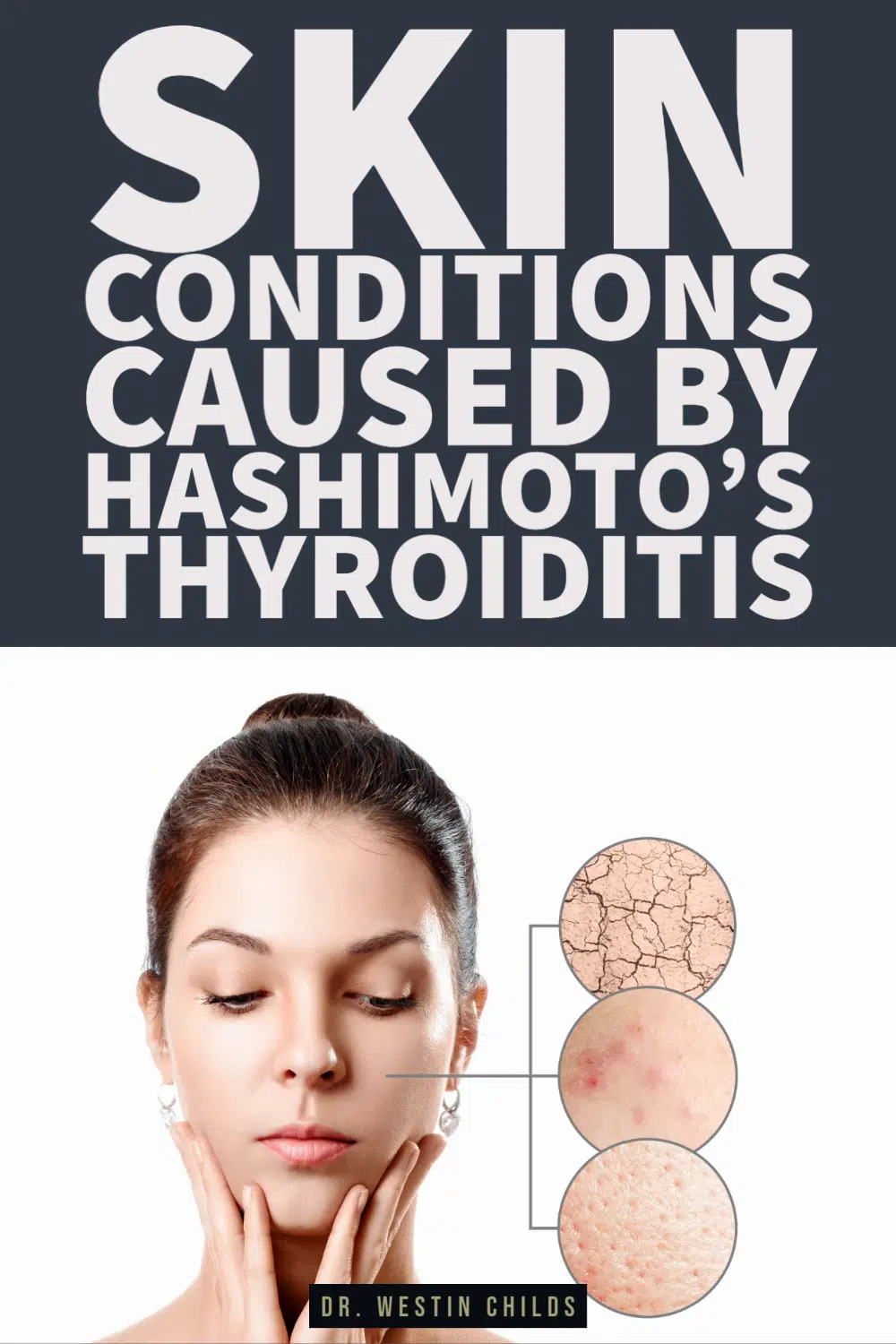
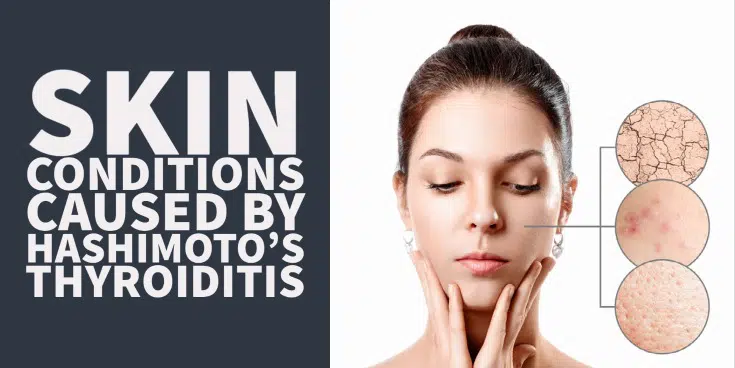

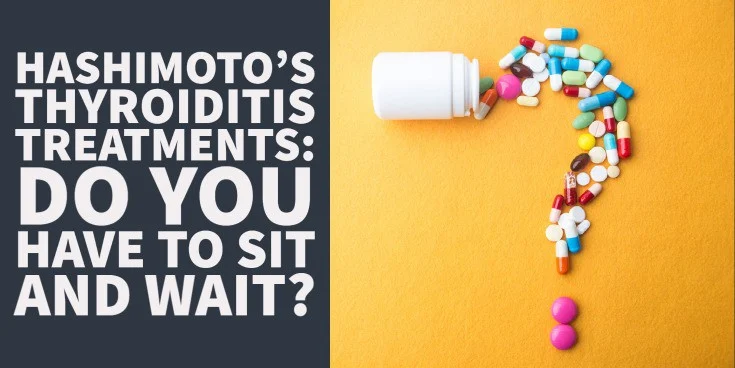

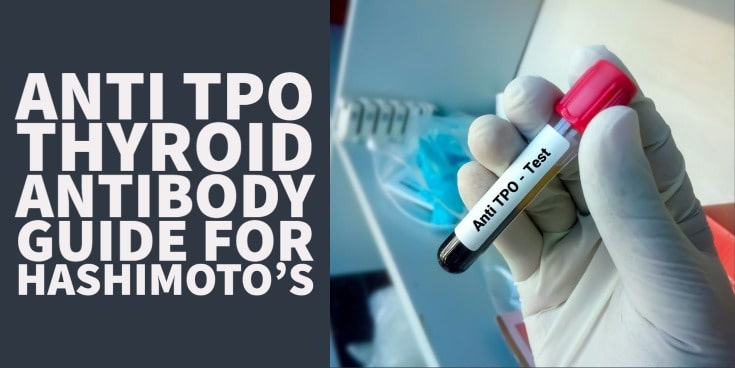
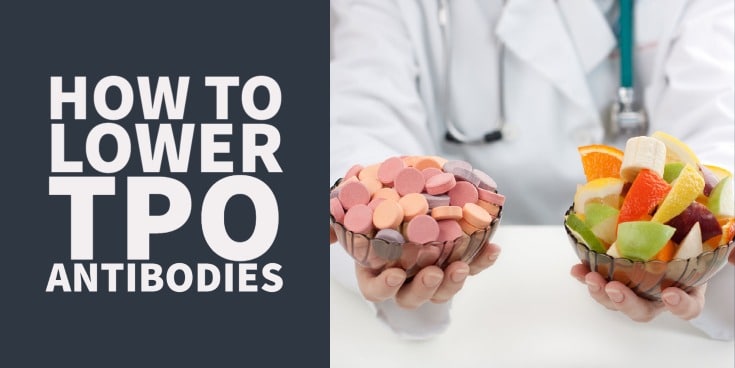
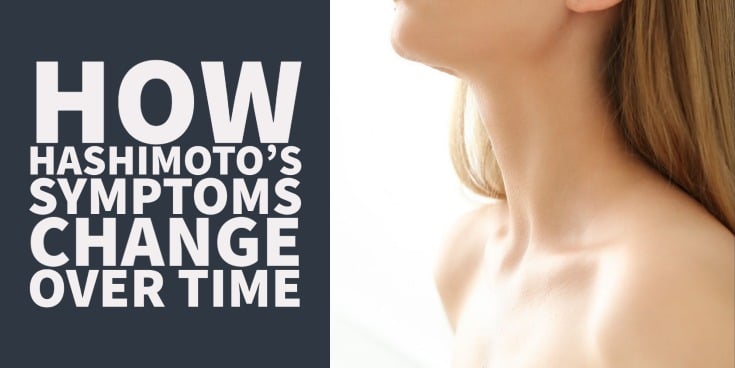
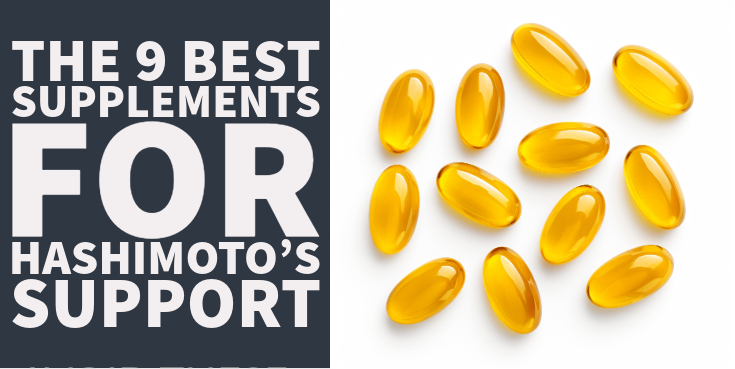

Dr. Childs, I don’t have a rash, or pustules, anything visible on my skin, but I have been suffering from all over body itch for about 15 years. That’s just about the time frame of being diag. with acquired hypothyroidism and type 2 diabetes. I can’t tell you how many doctors I’ve gone through looking for relief. They have made it plain they are not concerned with my itching. I suppose bc it’s not going to kill me. It only makes me wish I was dead. What can I do to lessen this itch? I’m assuming it’s caused by hypothyroidism. Please help.
Hi Judy,
Have you looked into histamine intolerance?
Hi, I have histamine intolerance so I would advise looking up the list of high and medium histamine foods and try going on low histamine for a month and see if that helps. Also, there are supplements that help lower histamine. Also high estrogen can make it worse and I am on estrogen but try to take the lowest amount I need. I also have interstitial cystitis and high oxalates so see if you have any of these symptoms. When I have itching I put ice on myself or after a shower, use cold water for a few seconds. Also a benedryl every few nights helps. Most of all….never eat left over meat. When we have meat I get one serving and the hubby eats the rest. Meat grows histamine very quickly after cooked and you cannot cook it back off. Feel free to email me if you’d like more advice. Email us: Click to view address
Dr. Childs
I was diagnosed with hypothyroidism 4 years ago . My face was red and had a rash as well on face and neck. Since then my skin has been extremely dry . The dryness is on my face , arms , legs , feet and between toes as well . I had to put moisturizer constantly several times during the day . Skin is very tight , although my skin is extremely dry , is very soft to the touch and it looks good! (Several people have told me )
I was on levothyroxine 25 mcg and recently switched to Armour thyroid 15mg to see if will help with my skin.(still the same)
Blood work shows that my thyroid levels are normal .I have done several test and they all look normal , except for vitamin D which I’m taking also .
Tsh 1.75
T3 reverse 12 ng
T4 free 1.2
I’m not able to loose weight and constantly constipated .
I’m very lucky to have a doctor to listen to me , wondering what can I do to make my skin less dry ?
Please help!!!!
Hi Laura,
The first place I would look at is improving your TSH either with more medication or via supplements. You can get an idea of where you want your TSH here: https://www.restartmed.com/tsh-levels-normal/
I take magnesium glycinate, for bedtime and either magnesium taurate or magnesium citrate with dinner for constipation. I eat a lot of free range eggs and protein can increase constipation. Just experiment until it works. Avoid magnesium oxide.
I had a partial thyroidectomy in 2014, and have been working to optimise thyroid levels with T4, Liothyronine, and improving Vit D Ferritin, Fe, B12, etc. All with the help of your blog, which guides me in my supplement choices. My regimen includes biotin, and my hair is healthy, as are nails and eyebrows.
That said, I’ve noticed that my eyelashes (always long and thick) have thinned out to where they’re short and sparse. I’m due for labs soon, but less than 6 months ago, all my bloodwork showed levels were very close to, or exactly where they needed to be.
All my research tells me that eyelash thinning is a normal part of ageing, menopause, etc (just turned 50). Needless to say, not what I want to hear. I also rarely wear eye makeup. My question is, do i suck it up and accept this as “normal” for my age, or should my eyelash health be in line with my hair, eyebrows, etc? I’ve looked into Latisse, which for any other woman my age, I’ve also learned can cause peri orbital fat loss (like I don’t have enough of that already!). Is there anything else that could possibly help?
thank you for your time.
Hi Melissa,
I wouldn’t accept it. There may not be anything you can do but I would certainly try. You can check out some of the therapies here: https://www.restartmed.com/treatments-for-thyroid-hair-loss/
Dr. Childs, I’ve suspected I have Hashimoto’s for five years now! Reading the symptoms you describe makes me even more sure. I have facial swelling (especially around the eyes), eyebrow hair loss, and I break out in itchy hives daily unless I take Zyrtec! I’ve also gained 80 pounds over five years and can’t lose it, I have chronic insomnia, aching feet, and vitamin D deficiency. But I’ve been to three doctors who would only test my TSH and Free T3 and they all said there’s nothing wrong with my thyroid. I’m so depressed. Where can I find a doctor who will listen to me? Should I start taking some over-the-counter supplements to get some relief? Help!
TSH: 1.18
Free T3: 2.9
Hi Lisa,
Please see this article which discusses how to find a knowledgeable doctor: https://www.restartmed.com/how-to-find-a-doctor-to-treat-your-thyroid/
Thank you for this awesome article. I do have quite a few issues you have mentioned and I have a confirmed Hashimoto’s. The eyebrow hair loss, the gluten sensitivity, cold intolerance and many others. What I was surprised the most are those symptoms I didn’t even think are somehow connected with my condition. The nail psoriasis and hyperceratosis in particular. It’s very nice to know more and be fully informed about what’s going on in your body. Thank you doctor for your hard work! I’ve been reading your articles for years now and very appreciate the information you give. Greetings from Ukraine
Hi Julia,
My pleasure and glad you find the information helpful!
Dr. Child’s, I’ve been dealing with thyroid problems for at least 40 years. I’m 76. I have acne and weight problems plus ridged fingernails, much thinner hair and constantly cleaning the shower drain. I have a fungal problem in my eyebrows and a few places on my face. Acne is worse on my chin, nose and between my eyebrows. I’ve dealt with a wide range of emotions because of my thyroid. I am on anti depressants. My emotional state has leveled off threw the years thank goodness. I just think my health could be better but it’s difficult finding a doctor that addresses the thyroid problems. My doctor doesn’t seem to think that any of my problems are related to my thyroid and acts like I’m just a complainer. I have to fight to get any tests done except TSH and T4. I have been told in the past by one doctor that I was hypothyroid and another doctor that I had always been hyper thyroid. I’ve had my thyroid ablated but it grew back at least partially. I’m sure there are many women that need better doctors for their thyroid. Thank you for all the information you give.
I’ve had Hashimotos for about 30 years and on 120 mg Armour thyroid for a very long time. About a year ago, I developed a cellulitis in my right leg and it’s still a problem. It’s not infected, but red, rough skin is very itchy. And I have a rash on the back of my calves. Plus, months ago, my dog got fleas and I had multiple bites. They are still sore and itch a lot. Do you think I should have my doctor switch me back to synthtoid? Of note, I take multiple supplements including Vit D, C, B complex, selenium, boron, quercetin. I was treated for h. Pylori a couple of years ago with massive antibiotics. TY. I appreciate your feedback.
Hi Pat,
It depends on whether or not you did better on the Armour thyroid. Most people do better on Armour vs Synthroid but that isn’t true for everyone.
Hi I’ve had hypothyroid for over 30 years and I have a lot of the symptoms mentioned including dry skin, a difficult time losing weight, this year I was diagnosed pre-diabetic and so much more but anytime I go to a primary care DR. they know I have hypothyroid and never mention that any of these symptoms are related to my thyroid. I was diagnosed with 2 large nodules on my thyroid and had them biopsed with benign result ,but none of the Dr’s suggest having my thyroid removed ,actually just the opposite and tell me to get it re-tested in a year. I really don’t know what to do. Help!!
Hi Nancy,
The single best thing you can do is to find a doctor who can help treat you correctly! Please see this resource: https://www.restartmed.com/how-to-find-a-doctor-to-treat-your-thyroid/
Hi I have just found out that after 22 years of finding out I am hypothyroid, i have just had a private blood test and found to have hashimos disease all this time.I have been having ridges on my finger and toenails for 5 years or so. I also have which self diagnosed scalp psorisis. i had this for years.I went to the docter years ago and just got this tar shampoo.I am using t gel on it but its not going away.It can be really itchy and distressing.Can I get something better to cure this please.I am on thyroxine 100mcg
Hi Mrs. Helen Massie,
Are you looking for treatments for the Hashimoto’s component or the psoriasis component? Fortunately, therapies that help to improve immune function may actually have an impact on both. I would recommend checking out these articles for a list of natural therapies that can help improve your thyroid:
https://www.restartmed.com/natural-thyroid-remedies/
https://www.restartmed.com/natural-remedies-for-hashimotos-thyroiditis/
I have granduloma anulara. It g
Went awy first time after 2 years ,came back in about 6 or 7 months. Came back worse and some has gone but not all.
Some places are very dark others are just the outside circle.
Have been to dermatologist for biopsy.
Is this one of the symtoms?
Hi Jackie,
Based on available research, there does seem to be a higher incidence of granuloma annulare in patients with thyroid disease but I definitely wouldn’t say it’s common.
I have had exceptionally dry skin for several years. I recently started taking collagen and it is improving my dry skin. Is it bad for my thyroid?
Hi Sherri,
Taking collagen will not harm your thyroid unless you are doing something weird like taking it at the same time as your thyroid medication.
I can thankfully say as a low thyroid or Hasimoto’s patient, I’ve not experienced one of the issues listed, I have changed my food intake and mostly do the gluten
Free foods, however, losing weight has been a challenge, I’m working very hard on that
On the contrary my hair is thicker, I sweat appropriately, my skin isn’t dry, no hives, rashes, etc however, thank you for the information
Sincerely Deborah
Hi Deborah,
That’s good to hear! I hope you never experience them! But in case you do, this information is here for you.
Interesting information. I’ve had Hashi’s since the 90s. Hair nor eyebrows ever grew back. I’m tired of trying different supplements and options. It’s just frustrating. I just deal with it.
Hi Leona,
There are always things you can do to improve the quality of your hair if you have Hashimoto’s or any other thyroid disease! It definitely can take a lot of work on your end but it’s worth it.
Please see these resources regarding how to get back your hair if you have thyroid disease:
https://www.restartmed.com/thyroid-hair-loss/
https://www.restartmed.com/treatments-for-thyroid-hair-loss/
I had breast implants that caused my hypothyroid. They are now out, and the enlarged tongue symptom went away. I am no longer always cold. My thyroid medication was adjusted and I started taking iodine. I feel much better.
Hi Chezron,
Glad to hear you found what worked for you! If you don’t mind me asking, how long did you have your implants in and what type of implants were they? This is a topic I want to write about in more detail soon.
Oh, and my hair grew back full and wonderful after getting my implants out.
Hi, I have Graves’ disease and I eat paleo from December. About six weeks ago I was a bit weak and ate some pasta with cheese. The day after I got some weird looking acne over my body, had a biopt taken and it seemed to be folliculitis. On my hands however, I still have a rash, which looks like dishidrotic eczema and it heals very slowly. My take is, correct me if I’m wrong, that my body didn’t like the gluten and lactose.
Hi Riet,
Based on the information provided, that could very well be the case!
Hello,
I actually developed a skin condition called granuloma annulare around or shortly after the time I was officially diagnosed with hashimotos. I have had both conditions since 2010 and as yet have not found a cure for the GA skin condition. Steroid injections have worked on the skin lesions in the past when I was living in Australia, however I’ve not yet had any luck receiving that specific treatment where I now live (UK) so I’m feeling extremely depressed and disheartened as the lesions just keep appearing on other parts of my body and once they’re there they never go away on their own. I would love to hear how you would tackle this from the inside out as I do try to eat a whole foods clean unprocessed diet, but even that doesn’t seem to reduce the lesions. Your advice and insights would be so very much appreciated!
Hi Lija,
What I would typically do is take a look at the following areas and treat/balance them as needed:
– Gut health
– Stress levels
– Environmental exposure
– Detoxification routines
– Exercise routine
– Hormone balance
– Diet and food allergies
– Nutrient deficiencies
– Immune health/function
– Physical/structural imbalances
If you take this multifactorial approach you should be able to see results. I can’t personally treat you so you will most likely need someone to help guide you through the process, though, but my blog does have a lot of free resources you can use to help guide you as well.
A fantastic broad spectrum approach you’ve given me here, thank you so kindly. I research the hell out of everything and I’ll often get so overwhelmed and confused with conflicting information, so I’m really happy to have a list of things that could genuinely help me heal the autoimmune stuff with the skin too! Bless you for sharing your approach. If I lived in the US and I wasn’t a broke musician, I would love to work with you specifically, haha!
Hi Lija,
Happy to help!
Hi Dr. Childs,
This article really made me aware of my skin issues. I have graves disease and over weight having a hard time loosing the weight! When my thyroid is tested, I am always “just fine” within the right levels.
I have very dry skin and thickening of the skin noticed on my lower legs and feet. I have pre-tibial myxederma. I have blistering than it painful when they pop or drain and leave open sores on my legs. Anything you would suggest for this?
I have hair loss, just hair everywhere! I still have plenty of hair and I feel lucky! I have facial swelling especially in the pockets around my eyes in the mornings. My eyes constantly water and cry tears. Suggestions for these problems?
Thank you.
Janet
Hi Janet,
Of course! I have written extensively on what causes thyroid hair loss and how to prevent it.
Please see these articles which walk through both topics in great detail:
https://www.restartmed.com/thyroid-hair-loss/
https://www.restartmed.com/treatments-for-thyroid-hair-loss/
This list of skin based conditions for hypothyroidism is missing lichen sclerosis. A study I read recently showed that as many as 1/3 of lichen sclerosis suffers also are hypothyroid.
Hi Connie,
Great point! This list was more specific to Hashimoto’s but there’s certainly overlap between the two and this list is not exhaustive so thank you for sharing.
Dr. Child’s,
I am currently experiencing painful hives on my right forearm and blisters are appearing on both hands. If I was dishes, the water has to be luke warm as anything hotter cause MAJOR itching in both hands. Any recommendations?
Why does my doctor keep minimizing my symptoms even though I have been diagnosed with Hashimotos? They continue to tell me my eye and skin problems are allergies. I have never had allergies and the allergy medication continue to not work. When I suggested eczema or something with my thyroid they ignore me and insist it is all caused by allergies!? I gave up on testing for my thyroid levels as they kept saying they’re normal but my symptoms remain.
Hi Tamara,
Unfortunately, that’s the current plight of all thyroid patients which is explained in more detail here: https://www.restartmed.com/doctors-fail-thyroid-patients/
Hi Dr. Childs,
I was just diagnosed with Hashimoto’s a week ago after having hypothyroidism for at least 30 years (I am 46). My Mom was recently diagnosed with Hashimoto’s also. I developed vitiligo in preschool, have always had dry skin, and while I never really experienced acne even during my teenage years, for the last year my face has been extremely rough. I also will only sweat from the head and neck (armpits/body are always dry). I’m happy to find your articles! Thank you!
Sincerely,
Holly B.
Hi Holly,
Glad you found them as well! Thanks for sharing.
I have many hypothyroid symptoms according to the information you have provided. Last year I had a thyroidectomy and my symptoms are worsening — of course I’m taking levothyroxine. Anyway, I have a question about hair loss. I do not have any body hair on my arms, arm pits, or legs. Is this possibly associated with thyroid issues.
I’m someone who does not perspire but have always been told it was just normal for me!
Hi Katherine,
Yes, it could be, it could also be related to nutrient and blood flow. I would recommend looking into the following:
– Vibration therapy for your legs to stimulate blood flow
– Sauna and red light (if available)
– And these supplements:
https://www.restartmed.com/product/thyroid-daily-essentials-thyroid-multivitamin/
https://www.restartmed.com/product/thyroid-hair-regrowth-complex/
https://www.restartmed.com/product/thyroid-collagen-complex/
Hi Dr
Many thanks for your continuous support and information.
Initially about 4 years back when I had my first test ..t4 was slightly high and tsh were high ..my tpo were about 150.
I took medication and since that my t4 were ok but tsh higher than 4 but less than 8
Iam taking 75 mg ..could this condition be
Subclinical hypothyroidism…if so any recommendations from you
Thanks and kind regards
Babikir
Hi Babikir,
It certainly could be, but that would depend on your current set of symptoms. If you are feeling hypothyroid, then it’s often safe to just assume you are and treat accordingly.
If you are looking to support your thyroid, start with these:
https://www.restartmed.com/product/thyroid-daily-essentials-thyroid-multivitamin/
https://www.restartmed.com/product/thyroid-adrenal-reset-complex/
https://www.restartmed.com/product/thyroid-b-complex/
I ordered your Essential T2 and T3 Conversion Booster – how do I take those? Do they need to be taken with anything else for maximum efficiency?
I have been diagnosed with Lichen sclerosis (9 months ago) and I have rosasea on my face (about 4-5 years ago) and have had an itchy spot on one breast (about 5-6 years) I have hypothyroidism for about 15 years now. Dr. says my levels are good but I am always cold, brain fog, struggles with weight, gut sensitivities. developed gerd that was so bad, that landed me in the hospital. My nails bend and break easily even with taking collagen for 3 years now, puffy eyes, dry eyes, post nasal drip and a constant feeling of I’m getting sick. Im exhausted and can barely stay awake when I stop for the day. Eye pain and itching. My eye doctor suspects Sjorgen’s or hashimotos.but my doctor says im good when he tests. I take 100 synthroid a day. Do you think this might be Hashimotos? I also take zink every day as well as a brazil nut to help support my thyroid.
I have almost all of these symptoms – yet I was taken off T3 (Cytomel) by an endocrinologist because “my labs are normal”. She also told me to avoid iodine.
Before this, an LLMD had me taking iodine supplements and prescribed Cytomel. He knew my labs were “normal” but I had all of these symptoms (dry skin, horrible fatigue, hair loss, cold all the time).
By the time I needed to go back to the LLMD (I did everything the endocrinologist said and just kept feeling worse) he had retired and now no doctor will believe I need thyroid medicine to function. He treated me by symptoms and they refuse to look at anything but labs.
I’m sorry for the long story. I would appreciate being pointed in any direction that would help. Thank you so much for providing these resources!
Hi Katie,
The best course of action is to get back on whatever was working previously. If that’s not an option, you can try the addition of these supplements:
https://www.restartmed.com/product/thyroid-glandular-plus/
https://www.restartmed.com/product/essential-t2/
https://www.restartmed.com/product/t3-conversion-booster/
Thank you so much for taking the time to read my question and reply. I appreciate it so much ❤️.
My doctors refuse to prescribe anything. I will do whatever I can do on my own (and with your resources). Thank you.
hi doc i may be in the minority but i’m 64 yr old male with hashimotos and it has been a bear to get right, i get the same your labs ok but im fatigued still, question does hashimoto cause rosacea?
Hi Stacey,
Sort of. Hashimoto’s doesn’t cause rosacea, but the two conditions are certainly associated with one another and may co-exist.
Hello Dr. Childs,
You mention the hashimotos and vitiligo connection – Im interested to know if you have recommendations or suggestions to treat vitiligo. I have managed to get TGaB, and TPO down quickly some years ago ( they were never very high to start with), but got diagnosed with vitiligo 3 years ago and my face is the worst – very patchy, my whole torso and most of my legs have de pigmented.
I truely believe if there is an ‘attack’ on my melanocytes, I should be able to reverse this so I can start to heal. I have done a lot of work on my thyroid to make it optimal, as well as my b12, zinc, selenium, iron and vitD .
Do you have any insights or suggestions ?
Thank you
Hi Pat,
You can often halt the progression of the disease, but if permanent damage has already occurred, you can’t reverse that portion. This is similar to the idea of reversing Hashimoto’s. You can halt the progression of thyroid gland destruction, but once destruction has occurred, however much, some of it will be permanent.
The same treatments that are used to treat Hashimoto’s will also be helpful when treating vitiligo because, at its core, it’s a disease of the immune system, not the skin.